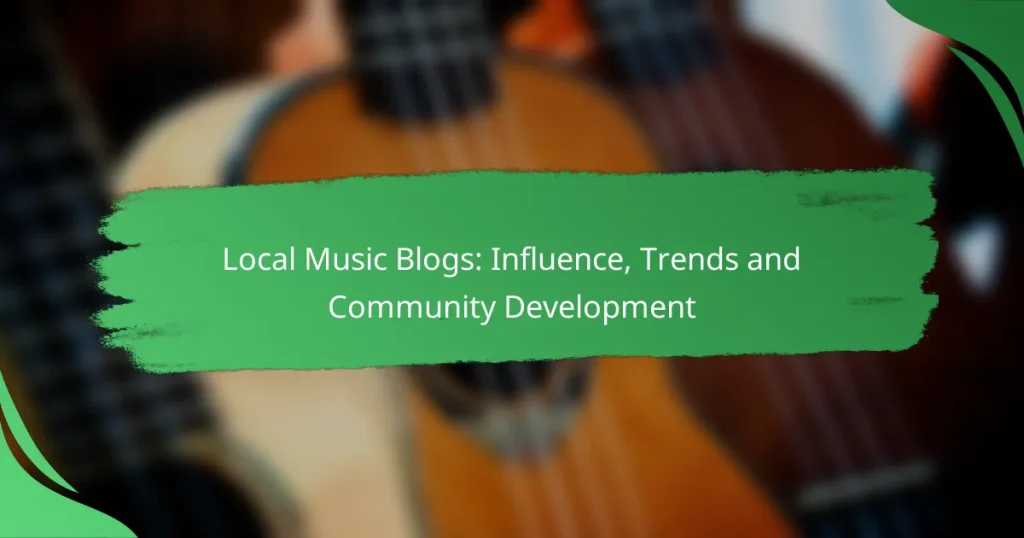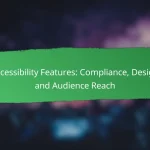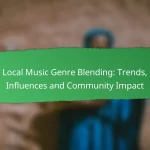Local music blogs serve as vital hubs for community development, championing local talent and fostering collaborations among artists and businesses. By embracing digital platforms and social media, these blogs not only reshape how communities engage with music but also enhance e-commerce opportunities, allowing artists to connect directly with fans and promote their work effectively.
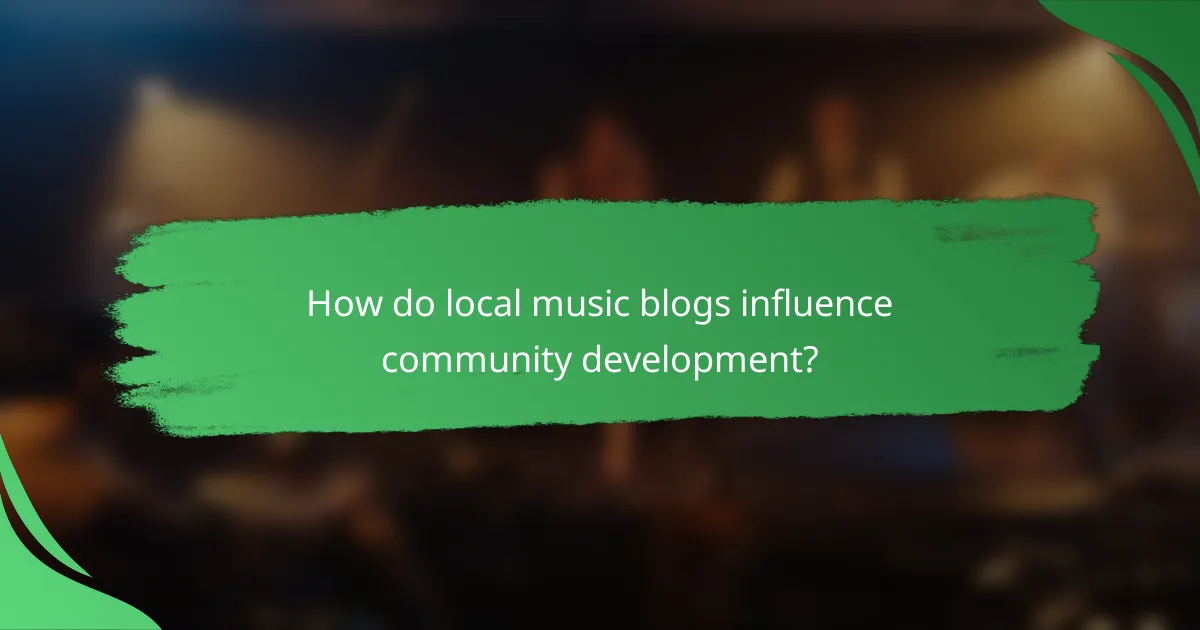
How do local music blogs influence community development?
Local music blogs play a significant role in community development by promoting local talent, organizing events, and fostering collaborations among artists and businesses. These blogs create a vibrant ecosystem that supports the growth of the local music scene and strengthens community ties.
Promotion of local artists
Local music blogs serve as platforms to showcase emerging artists, helping them gain visibility and connect with audiences. By featuring interviews, reviews, and music releases, these blogs can elevate the profiles of local musicians and encourage fans to support them.
For instance, a blog might highlight a new album from a local band, leading to increased attendance at their shows and boosting sales of their music. This promotion not only benefits the artists but also enriches the community’s cultural landscape.
Creation of music events
Many local music blogs actively organize or promote events such as concerts, festivals, and open mic nights. These events provide opportunities for artists to perform and for community members to engage with the local music scene.
By collaborating with venues and sponsors, blogs can help create events that attract diverse audiences, fostering a sense of community and shared experience. For example, a blog might partner with a local bar to host a monthly showcase of new talent, drawing in both music lovers and casual patrons.
Fostering local collaborations
Local music blogs often encourage collaborations between artists, producers, and other creatives, leading to innovative projects that benefit the community. By highlighting successful partnerships, these blogs inspire others to work together, enhancing the local music ecosystem.
For example, a blog might feature a story about a local singer-songwriter teaming up with a visual artist for a multimedia performance, showcasing the potential of cross-disciplinary collaboration. This not only promotes the individuals involved but also enriches the cultural offerings available to the community.
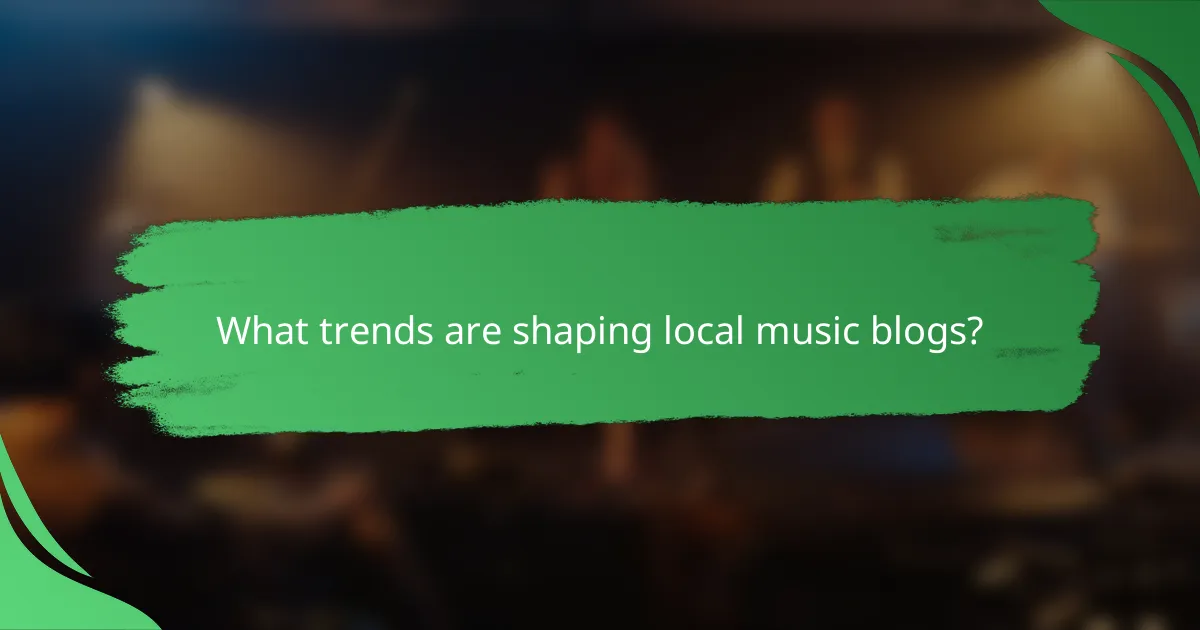
What trends are shaping local music blogs?
Local music blogs are increasingly influenced by digital platforms, niche genres, and social media integration. These trends are reshaping how communities engage with music and discover new artists.
Rise of digital platforms
The rise of digital platforms has transformed local music blogs into accessible hubs for music discovery. Websites and apps like Bandcamp, SoundCloud, and Spotify allow bloggers to share and promote local talent easily.
Bloggers can now embed music directly into their posts, enhancing user engagement. This shift has made it simpler for readers to explore new sounds without leaving the blog, increasing the likelihood of discovering local artists.
Focus on niche genres
Many local music blogs are honing in on niche genres, catering to specific audiences that larger platforms may overlook. This focus allows bloggers to build dedicated communities around particular styles, such as indie rock, folk, or electronic music.
By concentrating on these genres, blogs can provide in-depth coverage and foster a sense of belonging among fans. This approach not only helps local artists gain visibility but also encourages passionate discussions within the community.
Integration of social media
Social media integration is crucial for the success of local music blogs, as it enhances their reach and engagement. Platforms like Instagram, Twitter, and Facebook allow bloggers to promote their content and interact with their audience in real-time.
By sharing snippets of blog posts, live performances, or artist interviews on social media, bloggers can drive traffic to their sites. Engaging with followers through comments and shares can also create a loyal readership and encourage community participation in local music events.
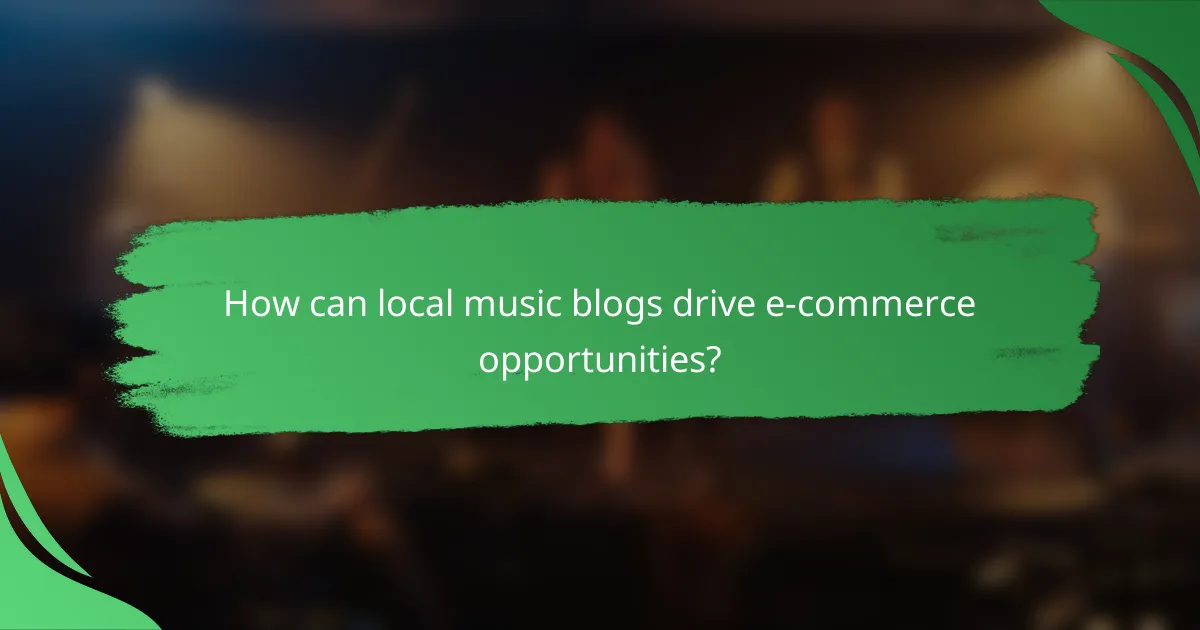
How can local music blogs drive e-commerce opportunities?
Local music blogs can significantly enhance e-commerce opportunities by connecting artists with fans and promoting merchandise, tickets, and music products. By leveraging their audience, these blogs create a platform for artists to sell directly to consumers, increasing revenue streams and community engagement.
Merchandise sales for artists
Local music blogs can boost merchandise sales for artists by featuring their products in dedicated posts or reviews. This not only raises awareness but also provides a direct link for fans to purchase items such as T-shirts, vinyl records, and other branded goods. Artists often see a notable increase in sales when their merchandise is highlighted in a blog.
To maximize impact, blogs should include high-quality images and engaging descriptions of the merchandise. Additionally, offering exclusive discounts or limited-time offers can create urgency and encourage fans to buy.
Affiliate marketing for music products
Affiliate marketing allows local music blogs to earn commissions by promoting music-related products from various retailers. By embedding affiliate links in their content, blogs can generate revenue while providing valuable recommendations to their audience. This can include anything from instruments to music software.
Choosing reputable affiliate programs that align with the blog’s audience is crucial. Blogs should focus on products that are relevant to local music scenes, ensuring that recommendations resonate with readers and enhance trust.
Event ticket sales
Local music blogs can facilitate event ticket sales by partnering with venues and promoters to offer tickets directly through their platforms. By promoting upcoming shows and providing easy access to purchase tickets, blogs can help increase attendance while earning a commission on sales.
To effectively drive ticket sales, blogs should create engaging content around the events, such as artist interviews or previews of the performances. Including clear calls-to-action and links to ticket sales can significantly enhance conversion rates.
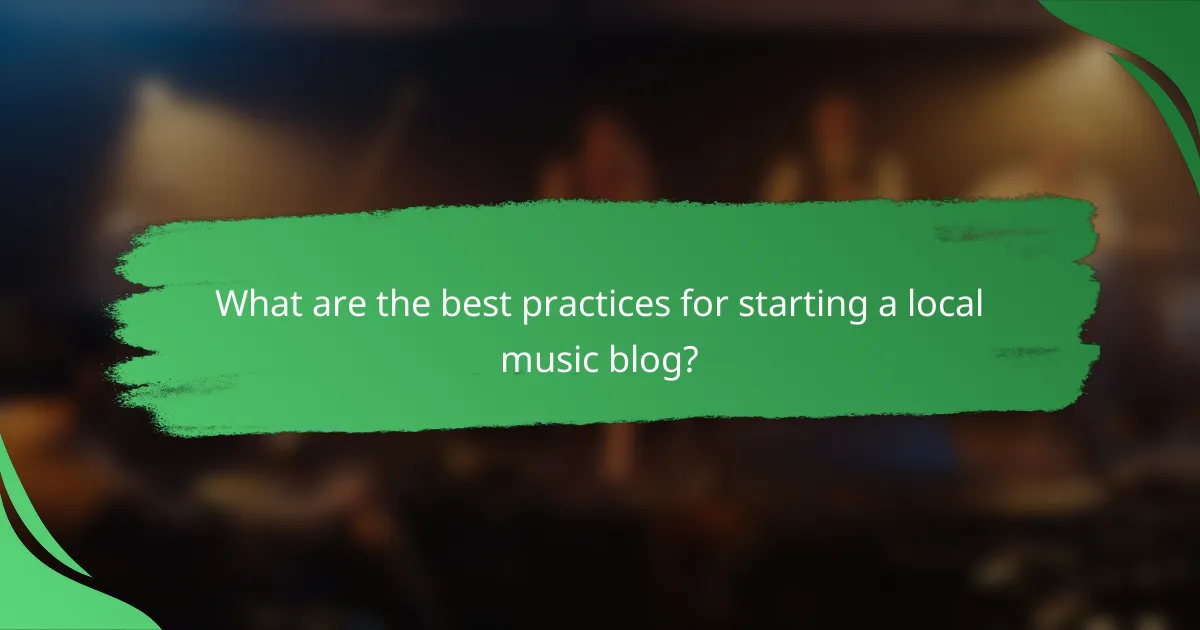
What are the best practices for starting a local music blog?
To start a local music blog effectively, focus on understanding your audience, creating compelling content, and fostering community engagement. These practices will help establish your blog as a valuable resource for local music enthusiasts.
Identifying target audience
Understanding your target audience is crucial for a successful local music blog. Consider demographics such as age, location, and music preferences to tailor your content effectively. Engaging with local music scenes can provide insights into what your audience values.
Utilize social media platforms and local music events to gather feedback and gauge interests. Creating reader personas can help visualize your audience and guide your content strategy.
Creating engaging content
Engaging content is the backbone of any successful music blog. Focus on writing articles that resonate with your audience, such as album reviews, artist interviews, and event coverage. Use a conversational tone and incorporate multimedia elements like photos and videos to enhance the reading experience.
Consider posting regularly, perhaps weekly or bi-weekly, to keep your audience engaged. Highlight local artists and events to foster a sense of community and encourage readers to share your content.
Building community connections
Building connections within the local music community is essential for your blog’s growth. Attend local shows, collaborate with musicians, and engage with other bloggers to expand your network. This can lead to guest posts, cross-promotions, and increased visibility.
Encourage reader interaction by allowing comments on your posts and creating social media groups. Hosting local music events or meet-ups can further strengthen these connections and establish your blog as a central hub for local music lovers.
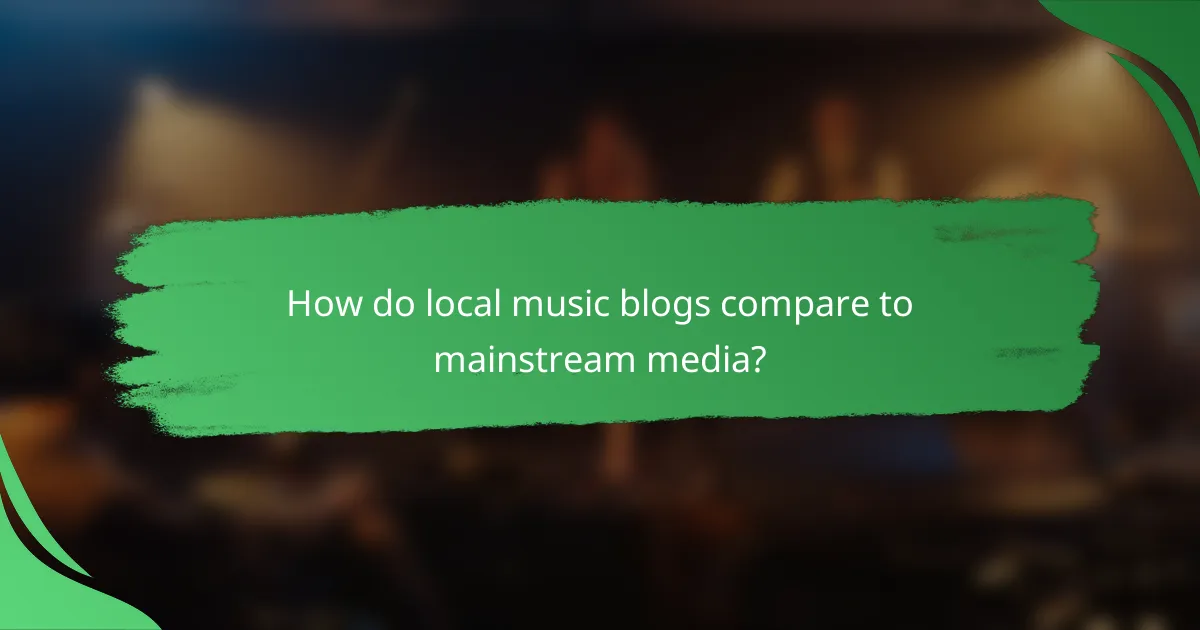
How do local music blogs compare to mainstream media?
Local music blogs often provide a more intimate and nuanced perspective on music compared to mainstream media. They focus on community-driven content, highlighting emerging artists and local events that may not receive attention from larger outlets.
Focus on grassroots movements
Local music blogs play a crucial role in supporting grassroots movements by promoting independent artists and local scenes. They often cover underground genres and niche events that reflect the unique cultural landscape of a community.
This grassroots focus fosters a sense of belonging among local music fans, as they can discover new talent and participate in events that resonate with their personal experiences. Blogs often collaborate with local venues and festivals, further strengthening these connections.
Personalized artist coverage
Unlike mainstream media, local music blogs provide personalized coverage of artists, often featuring interviews, behind-the-scenes stories, and reviews that highlight the artist’s journey. This depth of coverage allows readers to form a stronger connection with the artists and their music.
For example, a local blog might profile a rising band from the area, detailing their influences, struggles, and upcoming shows. This personalized approach not only informs readers but also encourages them to support local talent directly, whether through attendance at gigs or purchasing merchandise.
